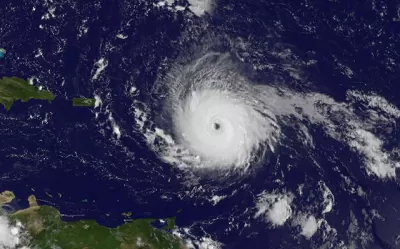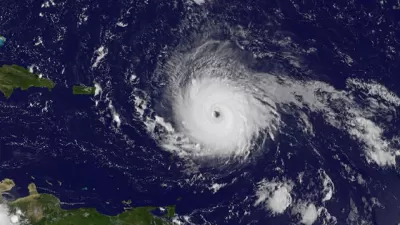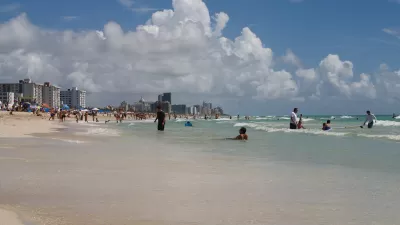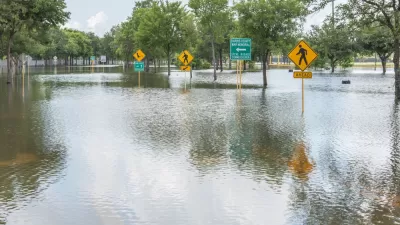As Houston and East Texas recover from Hurricane Harvey, an even stronger hurricane has formed in the Atlantic Ocean, headed to the Caribbean Sea, and likely Florida by this weekend, though there is uncertainty where it goes next.

"Hurricane Irma expanded into a 180mph 'superstorm' on Tuesday as officials warned of life-threatening winds, storm surge and rainfall in several Caribbean islands and emergency planners in Florida escalated preparations for a possible weekend strike," reports for the Guardian.
"Irma’s peak intensity so far ranks among the strongest in recorded history, exceeding the likes of Katrina, Andrew and Camille – whose winds peaked at 175 mph," report Brian McNoldy, senior research associate, University Of Miami and Jason Samenow, The Washington Post's weather editor.
First to feel the effects of Irma will be a group of Caribbean Islands known as the Leeward Islands on Tuesday, with Puerto Rico and the Virgin Islands on Wednesday. The Dominican Republic, Haiti, Cuba, and the southeastern Bahamas are also in the path of Irma.
“The chance of direct impacts from Irma later this week and this weekend is increasing in the Florida Keys and portions of the Florida peninsula,” the National Hurricane Center senior hurricane specialist Dan Brown said in his advisory.
Landfall expected in Florida Keys or South Florida by the weekend
On Monday, Gov. Rick Scott (R-Fla.) declared a state of emergency for all 67 counties in response to Irma.
"It is impossible to say with certainty whether Irma will track up along the eastern side of the Florida peninsula, the western side, or straight up the peninsula," add McNoldy and Samenow.
Beyond the weekend, the scenarios really depend on which side of Florida it tracks. But for now, it’s safe to say that the southeast United States, including the Florida panhandle, Georgia and the Carolinas, should also brace for potential impacts, such as flash flooding, storm surge and strong winds.
If Irma makes landfall as a Category 4 or higher in the United States, joining Hurricane Harvey, it will become the first time two storms so strong struck the United States in the same season.
And that's not all that's brewing in the Atlantic, warn Noldy and Samenow. " Tropical Storm Jose formed in the eastern Atlantic Tuesday morning. This storm is also predicted to intensify into a hurricane over the coming days, but the latest track keeps it away from land areas for the most part."
If you're thinking climate change must be playing a role, Samenow, The Washington Post's weather editor, explains in a perspective how climate change can exacerbate the effects of hurricane, Harvey in particular, though he doesn't mention if it affects the quantity of hurricanes, perhaps because it was published on Sept. 1. He lists them "from high confidence to low confidence:"
- By raising sea levels, climate change increased the rise in ocean water or storm surge when the storm came ashore and the coastal flooding that resulted.
- By warming temperatures in the Gulf of Mexico, climate change intensified the storm’s rainfall.
- By warming temperatures in the Gulf of Mexico, climate change intensified the storm’s peak winds.
- By slowing down the jet stream, climate change increased the likelihood the storm would stall and unload rainfall over the same areas.
His bottom line: "Climate change probably made Harvey a little worse. But you’re on shaky ground to say any less or much more."
FULL STORY: Florida prepares as Hurricane Irma grows into 180mph 'superstorm'

Maui's Vacation Rental Debate Turns Ugly
Verbal attacks, misinformation campaigns and fistfights plague a high-stakes debate to convert thousands of vacation rentals into long-term housing.

Planetizen Federal Action Tracker
A weekly monitor of how Trump’s orders and actions are impacting planners and planning in America.

In Urban Planning, AI Prompting Could be the New Design Thinking
Creativity has long been key to great urban design. What if we see AI as our new creative partner?

King County Supportive Housing Program Offers Hope for Unhoused Residents
The county is taking a ‘Housing First’ approach that prioritizes getting people into housing, then offering wraparound supportive services.

Researchers Use AI to Get Clearer Picture of US Housing
Analysts are using artificial intelligence to supercharge their research by allowing them to comb through data faster. Though these AI tools can be error prone, they save time and housing researchers are optimistic about the future.

Making Shared Micromobility More Inclusive
Cities and shared mobility system operators can do more to include people with disabilities in planning and operations, per a new report.
Urban Design for Planners 1: Software Tools
This six-course series explores essential urban design concepts using open source software and equips planners with the tools they need to participate fully in the urban design process.
Planning for Universal Design
Learn the tools for implementing Universal Design in planning regulations.
planning NEXT
Appalachian Highlands Housing Partners
Mpact (founded as Rail~Volution)
City of Camden Redevelopment Agency
City of Astoria
City of Portland
City of Laramie





























